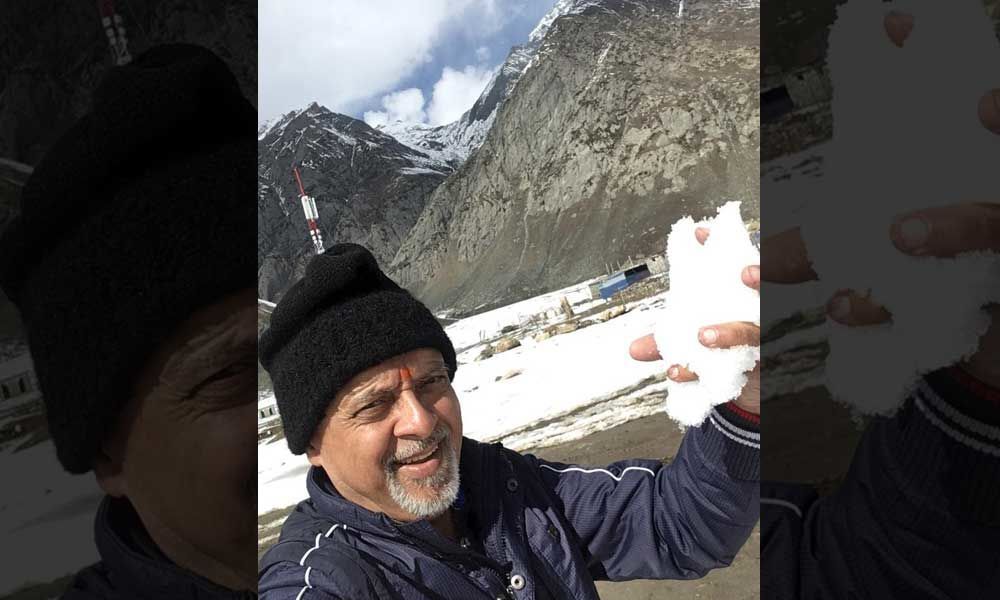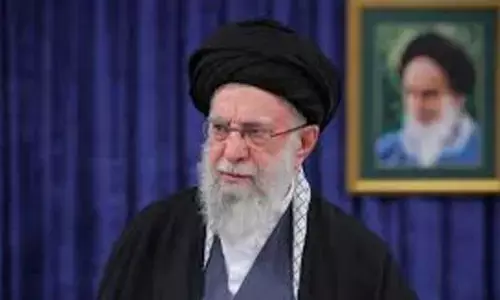Hyderabad's Kashmiri Pandits rejoice, go down memory lane

For many in the community, the recent developments in Jammu and Kashmir give a practical hope. They welcome the abrogation of Article 370 and the formation of union territories. The community is jubilant, but at the same time, they say that this is just the beginning and there is a lot more that needs to be done for making Kashmir a safer place for them
Hyderabad: Ksheer Bhavani temple in Srinagar flits through the mind of Rahul Razdan whenever he thinks of his homeland. Razdan, a Kashmiri pandit, vividly remembers the temple pond where he used to take bath and play with his friends while his parents attended prayers. Today, Razdan lives with his family in Hyderabad, a faraway city down south from the valley.
Razdan was 13 years old when he and his family had to leave Srinagar for Jammu. "My parents decided to leave the city in a matter of hours. Such tense was the situation in 1990. We carried very little baggage with us, as we thought we would return in at most 10 days," he recollected. He never went back to his city after that.
(Rahul Razdan)
"One morning, my father went to buy bread and on the way, he saw people being shot," Razdan said. He rushed back home, and he saw a notice attached to the front door that listed names of the people to be killed next, he said. The family set out to leave for Jammu, along with two other families, in a truck in the dead of the night.
The family of six had no idea where to go. However, they were relieved after they crossed the Jawahar Tunnel, which connected Kashmir to the rest of the country. They finally ended up in a single room at his uncle's house in Jammu. Many families lived in refugee tents. Many died due to heat strokes. Snake bites were common at the refugee tents. Razdan says that his family was lucky to get a shelter to live.
What transpired in Kashmir from September 14, 1989, to January 19, 1990, had led to a mass exodus of Kashmiri pandits from Kashmir. Some 3.5 lakh Kashmiri pandits left their homeland. They went to settle in different parts of the country. A few families came to Hyderabad. Today, some 300 families of Kashmiri pandits live in the city. Each one of them has a story to tell about what happened in those days. How they were forced to leave their land against their will and what they have missed.
(Ashok Munshi at Dras, Ladakh, 2018)
The assassination of Tika Lal Taploo, a popular Kashmiri pundit and social worker, on September 14, 1989, was the beginning of violence against the pandits. The day is commemorated as the Martyrs Day by the Kashmiri Pandits. Nilkanth Ganjoo, the High Court judge and another prominent pandit, was later killed in November. These targeted killings raised tensions in the valley. Notices on the walls listing targets and blaring threats at mosques have thrown the pundits into disarray. Add to it, the newspapers like Al Safa and Aftab cautioned pandits.
Ashok Munshi, a retired HMT employee who lives at Habsiguda in Hyderabad, was in Srinagar when all this was happening. He lived at Haba Kabal in Srinagar, which was the hub of Kashmiri pundits. He owned a house there. Lassa Kaul, director of Doordarshan, lived on the same street where he lived. Kaul was brutally murdered one day. "We moved to Jammu after that. I never went back to that place. My house was burnt," Munshi said.
Munshi was working at HMT, so he met with Jammu authorities, along 300 other displaced employees. Finally, he moved to Hyderabad in 1992 as HMT employee. "There were already 70 to 80 Kashmiri families living in the city by the time I came here," he said.
Munshi's two children, one in 1st grade and the other in 2nd grade at the time of exodus, suffered a lot because of the move. They went to refugee camp school in Jammu. The classes were conducted in the afternoon, and it was extremely hot compared to Kashmir, Munshi recollected. "We had a difficult time explaining our kids about what happened and why we had to move," Munshi said.
(Bharat Bushan Dhar)
Bharat Bushan Dhar, who works at an MNC in Hi-Tech City, was 16 years old when Kashmiri pundits were being attacked. He lived in Pazipora village of Kupwara district in Kashmir, just 13 km away from the PoK border. One night, all 11 families of Kashmiri pundit of the village started for Jammu on a single truck. They took little baggage with them. "We could not even carry with us the photo frame of my grandfather," Dhar said. All of his property was later burnt. He moved to Hyderabad in 2011.
"We do not have a native place. Many in Hyderabad do not know what happened in Kashmir. When I go, I go to Jammu, not Kashmir. There is nothing there," said Dhar. The young generation of Kashmiri pundits in Hyderabad hardly speaks the Kashmiri language. "We missed a lot," Dhar said.
"I am denied of my fundamental right to live in my home place," Razdan said. The rituals and language are dying. Kashmiri pandits are Internally Displaced Persons (IDPs) and have to go back to protect their identity. But, the conditions there must be livable. That is not the case in Kashmir right now, he said.
For many in the community, the recent developments in Jammu & Kashmir give practical hope. They welcome the abrogation of Article 370 and the formation of union territories. The community is jubilant, but at the same time, they say that this is just the beginning and there is a lot more that needs to be done for making Kashmir a safer place for them.
The members of the community in the city meet frequently for marriages and other occasions and when they meet they recollect their past. Most of them are professionals working at some multi-national companies. Education for children is the top priority for Kashmiri pandits, Razdan said.
"We miss the fragrance and beauty of Kashmir. We get nostalgic whenever we think of the place," said Razdan.









